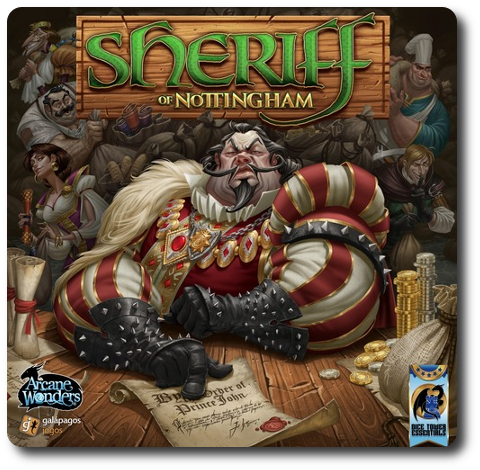
The Basics:
- For ages 7 and up (publisher suggests 13+)
- For 3 to 5 players
- Approximately 60 minutes to complete
Geek Skills:
- Active Listening & Communication
- Counting & Math
- Logical & Critical Decision Making
- Reading
- Memorization & Pattern/Color Matching
- Strategy & Tactics
- Risk vs. Reward
- Hand/Resource Management
- Bluffing and Misdirection
Learning Curve:
- Child – Easy
- Adult- Easy
Theme & Narrative:
- A savvy merchant knows how to lie to get by
Endorsements:
- Gamer Geek approved!
- Parent Geek approved!
- Child Geek approved!
Purchase:
Overview
The story of the heroic outlaw, Robin Hood, tells of one man’s attempt to bring down tyranny and rescue those who are victims of it. While Robin Hood’s exploits and those of his band of followers are well-known, there is another tale that is seldom told. The merchants that seemingly went about their business everyday at the market were also waging their own war against the unjust laws set by the Sheriff. Now you can join the struggle and make some money in the process.
Sheriff of Nottingham, designed by Sérgio Halaban, Bryan Pope, Benjamin Pope, André Zatz, and published by Arcane Wonders, is comprised of 144 Legal Goods cards, 60 Contraband cards, 12 Royal Goods cards, 110 Gold Coin tokens (in the values of 1, 5, 20, and 50 gold coins), 1 Sheriff marker, 5 Merchant Stand boards, and 5 Merchant bags. The game’s component quality is excellent. The gold coins, Merchant Stand boards, and Sheriff marker are made of thick cardboard, the Merchant bags are made of thick material, and the cards are made of out durable cardstock. Simply excellent.
Preparing to Go to Market
To set up the game, first give each player 1 Merchant Stand and 1 matching colored Merchant bag, which are placed in front of the player. There are no differences between the different merchants in the game other than the artwork that portrays them. Feel free to have players select the merchant they want or randomly deal them out. Any remaining Merchant Stands and Merchant bags not used go back in the box.
Second, place the gold coins in a pile (or a cup). This is the Bank for the duration of the game. Have one player take on the INCREDIBLY IMPORTANT role (no, not really) of the Banker . The Banker will be responsible for exchanging money and taking money, helping the game move along. The Banker should give each player (including themselves) 50 gold coins. The Banker should make certain not to “accidentally” mix their money with the Bank’s money. (Cyrus gives certain players a knowing look…you know who you are…)
Third, remove the Royal Goods cards and place them in the game box. These cards are used in a game variant. See “Game Variants” for additional details. Take the remaining Legal Goods and Contraband cards and remove any card that shows “4+” in the lower-left corner of the card’s face if playing with only 3 players. Shuffle the remaining cards together. This is the Goods draw deck for the duration of the game. Deal each player 6 cards from the Goods draw deck, face-down. Players should look at these cards, but keep them hidden from opponents. The Goods deck is then placed to one side of the game playing area, face-down.
Fourth, reveal the top 5 cards from the Goods draw deck and place them to the left of the Goods draw deck, face-up. This is the FIRST discard pile. Draw another 5 cards from the Goods draw deck and place them face-up to the right of the Goods draw deck to create the SECOND discard pile.
That’s it for game set up. Determine who will be the Sheriff first, give them the Sheriff marker, and begin.
Goods, Gold, Lies, and Bribes
As a merchant, the player is attempting to smuggle goods into the market to sell. Not all the goods are considered legal, however. The Legal Goods cards (always in green) represent the chickens, cheese, bread, and apples that do not raise any suspicion. The Contraband cards (always in red) represent the goods that the Sheriff has declared to be illegal. Both cards list the good’s value on the open and black market. Both cards also list the penalty which is used to determine how much gold a player must pay if penalized with a fine.
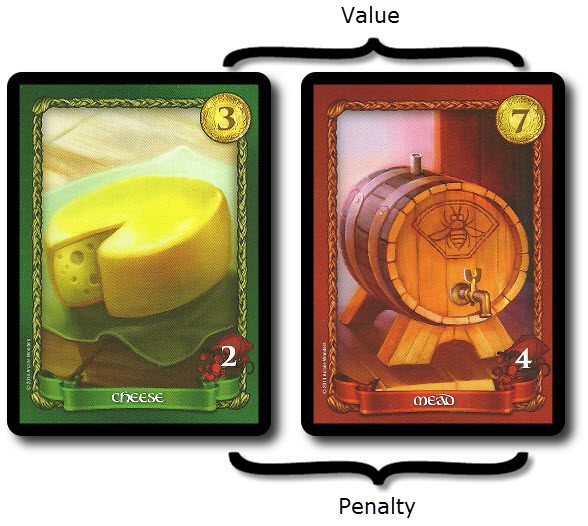
Gold is exchanged regularly in the game, both to pay fines and to bribe the Sheriff. In this game, bluffing and lying is perfectly acceptable, but there are limits to what a player can and cannot say. Players must declare a certain number of facts, but that’s it. Everything else is fair game. Table talk is encouraged, as is subtle manipulation.
When deals are made, they should be honored if they can be resolved immediately between the Merchant and Sheriff player. This includes exchanging of gold, cards, and information. Players can promise special favors later in the game, but these are not binding. Nothing in the rules ever forces a player to fulfill their promises or accept bribes. Additionally, promises of certain goods that might or might not be collected by the Merchant in their stand or in their bag could be used as bribes. If it turns out the card in question doesn’t exist, then the player is not obligated to provide it. Such is the slippery slope of doing business with a corrupt Sheriff and a rebel Merchant!
Of Subterfuge and Sales
Sheriff of Nottingham is played in rounds and turns. During each round, a player will take their turn with one player always acting as the Sheriff for the round and the other players acting as the Merchants. A typical game round, which is divided into phases, is summarized here.
Phase 1: A Trip to the Local Market
Starting with the player to the left of the Sheriff and continuing in clockwise order, each player will look through their hand and discard any cards they do not want (maximum of 5 cards). These cards are placed face-down. The player then draws back up to a total of 6 cards in their hand.
The player can draw from either discard pile and the draw deck, but they must do so in a specific order. Any player can at any time look through the discard piles, but cannot rearrange the order of the cards. If the player wants the 3rd card down in the discard pile, they must take the top 2 cards above it, as well. If the player takes a card from the draw deck, they can no longer collect cards from the discard piles.
Caution should be taken here. Drawing cards from the discard piles allows the player some semblance of control over what cards they are collecting, but the Sheriff can see what cards are being taken. The draw pile, on the other hand, gives the player complete privacy, but at the cost of not having any control of what they collect.
Finally, after the player’s hand is back up to 6 cards, the cards the player placed face down are now placed on one of the discard piles in any order the player likes. When placed, the cards should be face-up. Expect other players to look at the discard pile almost immediately.
When the player is done, the next player in turn order sequence takes their turn. When all the players except the Sheriff have had a turn in this phase, the next phase begins.
Phase 2: Load Merchant Bags
All the players now place 1 to 5 cards into their Merchant bag, taking care to be as secretive as they can about the number and type of cards they are using. The Sheriff may look intently at the other players, but cannot directly interfere or ask questions.
Players should also avoid letting opponents see what they are putting into their bags. A player’s opponent might offer information to the Sheriff in exchange for certain favors, or worse yet, they might remember what the player collected when it’s their turn to be the Sheriff.
When the player is done, they snap their Merchant bag closed and set it down in front of them, indicating they are done with the actions for this phase. When all players have completed their selection, the next phase begins.
Phase 3: Declaration of Goods
Starting with the player to the the Sheriff’s left and continuing in turn order sequence, each player informs the Sheriff what’s in their bag.
Sort of.
The goal here is to outwit the Sheriff by spinning full and half-truths. The Sheriff cannot look into the player’s Merchant bag during this phase, meaning the Sheriff has no real way of knowing if the player is telling the truth or not. While fibbing is permissible, and in my cases required, players have to follow 3 simple rules when declaring goods.
- The exact number of cards in the Merchant bag must be declared (if you put in 4 cards, you have to tell the Sheriff there are 4 cards in the bag regardless if the goods are legal or not)
- Only Legal Goods cards can be declared
- Only one type of Legal Good card can be declared (for example, if you had chickens and cheese, you could only declare one of them)
After the player has declared the supposed contents of their Merchant bag, they hand it to the Sheriff. When playing with Child Geeks, we let them hold their bags after declaring their goods to help the game move along faster and reduce the amount of reaching across the table.
Phase 4: Inspection
Now the Sheriff gets to have some fun. They have been sitting quietly and watching for the round attempting to determine who is attempting to break the law. Honestly, it doesn’t matter if a player is attempting to cheat the Sheriff or not because the Sheriff almost always attempts to cheat all the players.
The Sheriff can now inspect (open) any Merchant bag they like or none at all. Before they open a Merchant bag they can “threaten” the bag’s owner which is normally followed by a bribe.
And here is where things get interesting.
A bribe can be anything of value within the context of the game. The player can offer the Sheriff gold coins, previously collected Legal and Contraband goods from their Merchant Stand board, future favors, and my personal favorite, information about other players. The Sheriff is also welcome to negotiate, change the bribe, ask for more, and even ask for something specific.
Passing the Sheriff’s Inspection
If a bribe is agreed upon, whatever goods, gold coins, information, and services that were part of the bargain now trade hands or are kept for later use. The Merchant bag is then returned to the player, which should not be opened by the Sheriff. The player then opens their Merchant bag and reveals the cards to all the players at the table.
- All Legal Goods cards are placed face-up next to the player’s Merchant Stand board. These cards are public knowledge and can be looked at by any opponent anytime during the game. The player announces the number and type of each Legal Goods cards they have in their bag.
- All Contraband cards are kept face-down and placed next to the player’s Merchant Stand board. These cards are kept private and cannot be looked at by anyone but the player who owns them. Only the number of Contraband cards smuggled past the Sheriff must are declared. The type remains a hidden secret until the end of the game.
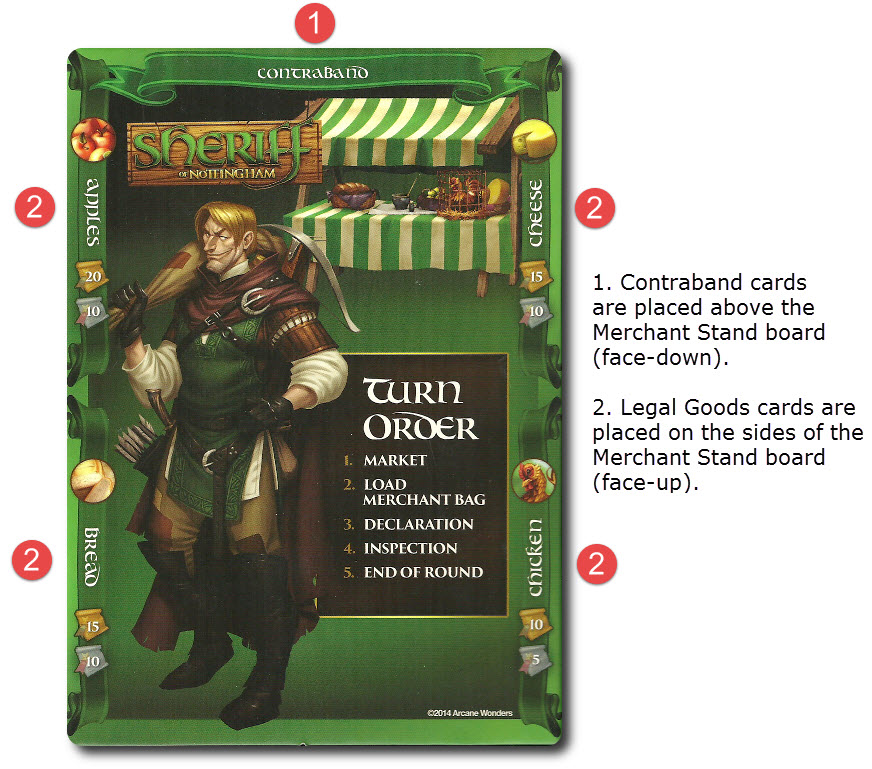
Detained by the Sheriff
If a bribe is not agreed upon or offered, the Sheriff takes the player’s Merchant bag and may open it. A player can also decide to not accept the terms of a bribe, most likely due to the Sheriff asking too much, in which case the Merchant bag is kept by the Sheriff and inspected.
If the Sheriff should find that the player was telling the truth about what was in their Merchant bag (exactly the same number and type of cards declared), the Sheriff must pay the player the total penalty value of all the Legal Goods cards in gold coins and return the Merchant bag. The Legal Goods cards are then declared by the player and placed face-up by their Merchant Stand board.
However, if the Sheriff should find that the player lied, the following occurs:
- All declared goods are given back to the player and are placed face-up next to their Merchant Stand board.
- All goods not declared are confiscated by the Sheriff and the player must pay the total penalty value for all the confiscated goods in gold coins to the Sheriff
- The Sheriff places all the confiscated cards on one discard pile in any order they like
If the player runs out of gold coins they must pay their fines using collected Legal Goods cards attached to their Merchant Stand board. The Legal Goods card’s listed value is equal to the same amount of gold coins. If the player doesn’t have Legal Goods cards, but does have Contraband cards, the Contraband cards must be used instead. If the player runs out of gold coins, Legal Goods cards, and Contraband cards, they are considered bankrupt and all fines and debts are canceled. The player can now go about the process of building up their wealth.
This phase continues until the Sheriff has had an opportunity to hassle each player in turn.
Phase 5: End of the Round
The Sheriff marker is now passed to the next player in turn order sequence and a new round begins. All players now draw back up to 6 cards in their hand, except for the Sheriff who should already have 6 cards from the previous round.
Closing the Market
The game ends when all of the players have had a chance to be the Sheriff twice (or 3 times in the case of a three-player game). When the final round ends, all players discard any remaining cards in their hand. Only those by the player’s Merchant Stand boards are counted for points.
Each player now reveals their Contraband and adds the total number of points earned by adding each Contraband card’s gold coin value (not the penalty value). Then the player does the same for their Legal Goods. Finally, the player adds the total value of any gold coins they still have.
But we are not done yet.
The players now organize their cards to see who has the most cheese, apples, bread, and chickens. The players who have the most and the second most of each type earn bonus points which are added to their total score. The title of “King” and “Queen” are given to each player who has the most for each category. Yes, you can be the “King of Chickens”.
The player with the most points wins the game.
Game Variants
A few game variants are provided for those who like to add a little variety to their game play. Each is summarized here.
Royal Goods
The Legal Goods and Contraband are of fair quality and are considered by the general populace to be more than tolerable. There are a number of goods, however, that the Sheriff has declared to be of extreme value and are also on the list of illegal items to sell. These are referred to as the Royal Goods. When setting up the game, add the Royal Goods cards with the rest of the cards. During the game, they considered a Contraband card, but when the game comes to a conclusion, they are so very, very much more. When determining the “King” and “Queen” bonus, the Royal Goods cards are added to the Legal Goods cards, adding 2 or 3 additional goods of that type.
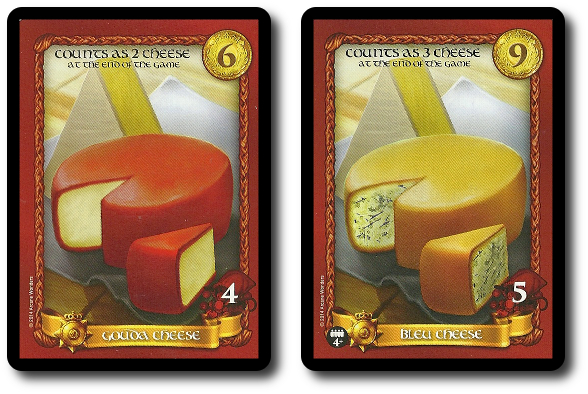
Now’s that’s some good cheese!
Inspection Time Limit
Normally, the Sheriff and Merchant can spend as much time as they need to agree upon a reasonable bribe or go through the painful process of having the Merchant’s bag inspected. This game variant puts a time limit of 1 minute for the Sheriff and Merchant to haggle and hassle each other. This puts a lot of pressure on the Sheriff and makes the game move at a frantic pace. Expect flustered Sheriffs, exasperated Merchants, and fun.
Removing Cards
There are a specific number of card types in the game. Individual who are paying attention to the visible cards can put together a pretty good picture of how many cards of each type are available. Very useful when a player is attempting to determine their odds of obtaining the “King” and “Queen” bonus at the end of the game or attempting to learn if a player is fibbing about their Merchant bag contents. This game variant removes 10 cards at random at the start of the game. These cards are placed back in the game box without any players knowing what cards were removed. Card counters are now out of luck.
Getting the Upper Hand
If the hand size is determined to be to small, increase the maximum number of cards to 7. This give the Merchant players an additional option, but it also makes the Sheriff player’s job slightly more difficult.
To learn more about Sheriff of Nottingham, visit the game’s web page.
Final Word
The Child Geeks jumped at the chance to lie, cheat, steal, and harass each other. All of which was well within the guidelines of the game. They quickly discovered that even friends can be enemies and that the only person they could trust was themselves. According to one Child Geek, “I know exactly who I can trust in this game. Me. Everyone else can go jump in a lake. I’m not trusting them.” Another Child Geek said, “You have to watch what you say and what you do in this game. I can feel the other players watching me and I know I’m watching them.” I was overjoyed to see the Child Geeks get into their roles, almost like they were role-playing, when it came time for the Sheriff to talk to each Merchant. The Child Geeks whined and pointed fingers when they were Merchants and spoke gruffly when they were the Sheriff. But most importantly, the Child Geeks demonstrated good card management and purposeful set collecting for the bonus points. When all the games were over the Child Geeks gave Sheriff of Nottingham their enthusiastic approval.
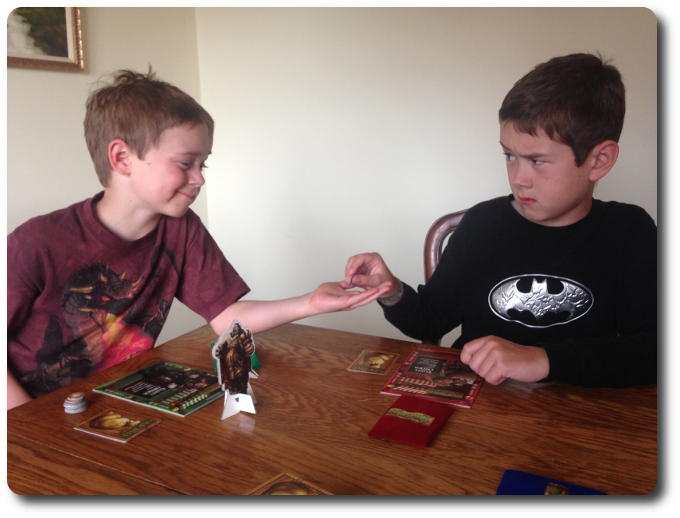
Our first game, learning as we played. My 7-year-old quickly mastered the art of “the Hustle”.
The Parent Geeks have played Bluffing games before and knew what was expected of them. The non-gamers did not. The non-gamers were the most surprised and the biggest fans of the game, finding it to be a strange mix of acting and bluffing. According to one non-gamer Parent Geek, “I feel like this is a card game, but with character’s in it.” All the Parent Geeks enjoyed themselves and the fact that the game allowed the entire family to play. One Parent Geek said, “Everyone can play this game and no one really has an advantage. My kids can beat me just as easily as I can beat them.” Very true, but only if the player has their wits about them. The only aspect of the game the Parent Geeks didn’t like was the downtime with the Sheriff and each Merchant. Most of the time, the Parent Geeks would get up and see what the kids were doing or get something to drink when they were waiting for their turn or waiting for the round to end. Regardless of the short downtime, all the Parent Geeks voted to approve Sheriff of Nottingham.
The Gamer Geeks found Sheriff of Nottingham to be a light game that could be played casually or cutthroat, depending on how the group was feeling. They quickly discovered that they could break the game if they did not take risks or attempt to bribe or bluff. According to one Gamer Geek, “If the players do not engage each other in the way the spirit of the game intended, this is pretty sucky game. But I don’t think it’s the game’s fault. That’s the player’s fault.” Another Gamer Geek said, “The game is so simple, but it can be so hard to win. I have to keep everything secret, but I have to watch everyone, too. When I’m the Sheriff, I’m going to use what I learn, because I know my opponents are going to do the same to me.” All the Gamer Geeks were very pleased with the game, finding it to be the perfect balance of deep game play and social interaction. Some mentioned similarities to Are You a Werewolf? and other Bluffing games, but all agreed that Sheriff of Nottingham was one they would play again anytime it was offered. The Gamer Geeks approved Sheriff of Nottingham without needing to be bribed.
Sheriff of Nottingham has two faults that cannot be avoided, fixed in the rules, or in any way overcome. The first is the game’s depth of play, which is completely dependent on the players acting out their roles as Merchants and Sheriff, doing all they can to bribe, bluff, and deduce. The game is little more than cards without the energy the players must bring to the gaming table to breathe life into the game play. Like many other games that require communication and player interaction, if individuals choose not to engage one another with bribes and bluffs, the game fails to entertain. Second, it’s possible for players to play it safe, risk it all, or find middle ground between the two extremes. If the players at the table are not risk takers and have no need to engage the Sheriff, the game again fails to entertain. Sheriff of Nottingham is about taking risks, pushing the envelope, feeling the rush of tricking the Sheriff, and agonizing over the burn of being caught. If players purposely seek out the safe path, their game will be boring.
Many will read the above and say, “Hey, Cyrus, you nitwit. These aren’t game faults! These are problems with the people!” Well, yes, of course, but when was the last time you saw a board game play itself? People are a component of the game. They are just as necessary as the cards, dice, tokens, and markers that are included in the game’s box. If players don’t sit at the table with the understanding that their role in the game is to lie, cheat, steal, bribe, bluff, and threaten, then they inflict as much damage on a game’s play as poorly written game rules.
So, is Sheriff of Nottingham a good game? It most certainly is not. It’s a great game. Its simplistic rules and straight forward game play allows just about anyone to sit down and play it. Non-gamers to gaming elitists enjoyed it. Child Geeks, Parent Geeks, and Gamer Geeks all enjoyed themselves. This is a game that engaged, enraged, thrilled, and satisfied all who played it. That, in my book, is a game worthwhile. I know I certainly enjoyed it and I’m betting you would to. Do give this game a try to see if you are crafty enough to bluff your way to victory.
This game was given to Father Geek as a review copy. Father Geek was not paid, bribed, wined, dined, or threatened in vain hopes of influencing this review. Such is the statuesque and legendary integrity of Father Geek.




“These are problems with the people!” Haha. That sums up so many nights at the gaming table. Just got this one out of the plastic and am looking forward to springing it on my non-gaming-geeky friends. I hope they have the same reaction as your players, can’t wait to play this weekend. Thanks for another informative review.
My pleasure and privilege, Penny. Thanks for taking the time to read the review and leave a comment. I hope your games are as fun and as frustrating as ours were.
Haha, we all LOVED it! Your observations were spot on – gamers and non-gamers alike were drawn to it. The non-gamers immediately wanted to play again. Now they are calling me the “Michael Jordan of Lying”… thanks I think? Really a darn good time!
Agreed! After playing the game with several friends, I now know exactly who I want to play Poker with…and who to avoid.
Pingback: Sheriff of Nottingham Game review | FLEAMEAT